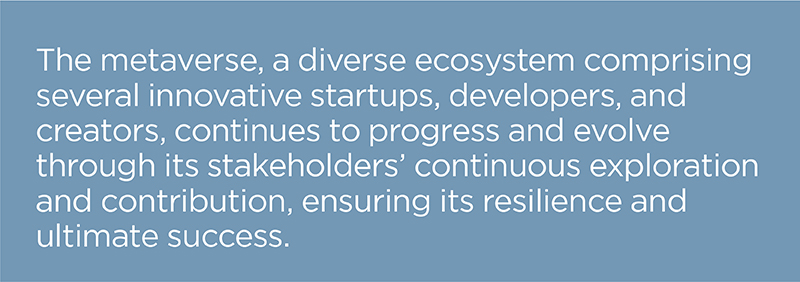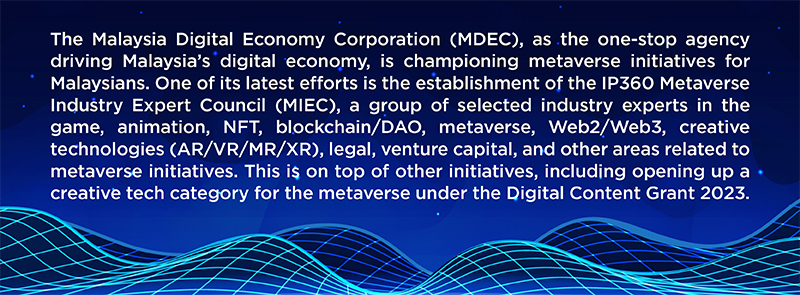Metaverse Shows Resilience Despite Setbacks from Major Tech Companies
Metaverse merges physical and virtual realities to offer immersive experiences and global collaboration, holding significant potential despite recent setbacks for some tech giants

Written by Digital Content Development Department, MDEC
The metaverse, an increasingly popular virtual environment, has recently faced setbacks as notable tech companies have downsized their metaverse divisions, leading many to question the viability and future of such virtual realms. However, it is important to acknowledge that the metaverse continues to hold relevance and promise, even amidst these obstacles. This frontier in human interaction, commerce, and entertainment has great potential for success and growth.
With the immense potential to revolutionise various aspects of our lives, the metaverse seamlessly integrates physical and virtual realities, enabling individuals to engage in immersive experiences, connect with others globally, and explore endless possibilities. Furthermore, the ability to transcend geographical limitations and constraints paves the way for new forms of communication, collaboration, and entertainment. Despite a few tech giants' setbacks, this immense potential remains prominent.
For instance, gaming companies like Epic Games have already demonstrated the popularity and revenue-generating capabilities of virtual worlds with Fortnite and Roblox. The education sector is also exploring the metaverse for immersive learning experiences. Platforms like Engage and AltspaceVR offer virtual classrooms where students can interact with each other and engage in collaborative learning activities.
While some major tech companies may have experienced setbacks in their metaverse endeavours, it is crucial to remember that the metaverse concept extends far beyond the efforts of a few players. Decentraland, Cryptovoxels, and Somnium Space are companies that build virtual worlds with unique features to attract more users and creators onto their platforms. The metaverse represents a vast and diverse ecosystem of numerous innovative startups, developers, and creators.
These individuals and organisations continue to explore and contribute to the metaverse's growth, ensuring its resilience and eventual success. The metaverse is not solely dependent on the actions of a few tech giants; it thrives on the collective efforts of an entire industry. One example is Mattle, the primary brand recently steered into Web3 with Fast & Furious NFTs. i

Despite recent setbacks, investors' interest in the metaverse remains strong. The metaverse is seen as the next frontier in technology and presents lucrative opportunities for growth and profitability. Venture capitalists and private equity firms recognise the transformative potential of the metaverse and are actively investing in startups and companies dedicated to its development.
This sustained investment ensures the metaverse will continue to evolve and mature, regardless of the challenges tech companies face. In recent funding rounds for metaverse-related companies, GEM in Everdome metaverse cost $60 million, while the Henan government invested $22 million. KPMG also recently reported 90% of investors remain optimistic about the metaverse development. The investors predicted the metaverse would be the next phase of the internet and envision a future where the metaverse would be utilised for work meetings, training, and learning experiences. ii

The widespread adoption of virtual reality (VR) and augmented reality (AR) technologies has laid the foundation for the metaverse's success. Users are increasingly embracing immersive experiences and seeking more interactive and engaging digital content. The metaverse offers a space where users can explore, socialise, and consume content in novel ways.

CoinTelegraph reported that news of Apple's new mixed-reality headset scheduled for release had caused a surge in metaverse tokens. iii Meanwhile, ten Japanese firms joined forces in Japan to create the metaverse economic zone on top of its government investment into metaverse and NFT expansion last October. iv
Collaboration and standardisation across the industry are essential to realise the metaverse's full potential. Industry players, including tech companies, developers, and authorities, must recognise the need to cooperate in building an inclusive and interoperable metaverse. While efforts are underway to establish common protocols, open standards, and frameworks that enable seamless integration and ensure a vibrant and interconnected metaverse, the industry can only overcome setbacks by creating a thriving metaverse ecosystem.
While setbacks faced by major tech companies may temporarily overshadow the metaverse's progress, the long-term potential and relevance of this virtual realm remain indisputable. The metaverse is more than the endeavours of a few companies; it represents a collaborative effort involving numerous stakeholders. The diverse ecosystem, sustained investor interest, growing user demand, and joint initiatives all point towards the metaverse's eventual success. As technology evolves and innovation flourishes, the metaverse will become integral to our future, transforming how we connect, communicate, and experience the digital world.




